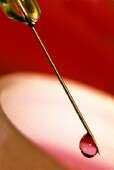Statin alternative looks promising in early trials

(HealthDay) -- Administration of REGN727, a monoclonal antibody to proprotein convertase subtilisin/kexin 9 (PCSK9), significantly reduces low-density lipoprotein (LDL) cholesterol levels, according to the results of three phase 1 studies published in the March 22 issue of the New England Journal of Medicine.
A new anti-cholesterol drug appears safe and effective in people already taking statins such as Lipitor, making it a potential addition to statin therapy or an alternative, a preliminary new study suggests.
Two single-dose trials in healthy volunteers and a multiple-dose trial in a group with high cholesterol showed that the drug, known as a monoclonal antibody, reduced low-density lipoprotein (LDL, or "bad") cholesterol levels an average of 40 percent. The injectable drug was also well-tolerated by all participants, with headache the most commonly reported side effect.
The drug works by attacking a destructive enzyme in the liver, keeping LDL cholesterol from spilling into the bloodstream, according to the report published in the March 22 issue of the New England Journal of Medicine.
"It was entirely safe, as best they could tell, and LDL levels plummeted within a matter of a few days and remained low for three months," said Dr. Kirk Garratt, clinical director of interventional cardiovascular research at Lenox Hill Hospital in New York City, who was not involved in the study. "If this antibody turns out to be as safe and effective as it appears, this may very well be a very important method for controlling LDL cholesterol, particularly in patients with [drug-resistant] cases."
The study, by Dr. Evan Stein, of the Metabolic and Atherosclerosis Research Center in Cincinnati, and colleagues, was funded by Sanofi and Regeneron Pharmaceuticals -- makers of the antibody.
About one in four Americans aged 45 and older takes statins, which interfere with the production of cholesterol in the liver, to control their high cholesterol levels and improve their odds against heart disease, according to the U.S. Centers for Disease Control and Prevention. While widely effective, some patients experience intolerable side effects -- which include liver damage or muscle pain -- and others don't achieve the recommended LDL blood levels of 70 milligrams (mg) per deciliter or lower for those at risk of heart disease.
Two randomized, single-dose studies of the antibody, known as REGN727, were administered either intravenously (in 40 participants) or by injection (in 32 participants) and compared with a group given an inactive placebo. These trials were followed by a randomized study of multiple doses in 51 adults with high cholesterol who were taking atorvastatin (brand name Lipitor) and whose baseline LDL levels were more than 100 mg per deciliter.
Higher doses of REGN727 lowered LDL cholesterol levels by up to 64 percent, and the effect was similar across the board whether or not participants were also taking a statin, which works by a different mechanism.
Commenting on the study, Christine Metz, head of the Laboratory of Medicinal Biochemistry at the Feinstein Institute for Medical Research in Manhasset, N.Y., said, "The next step would be to test a much larger group of people for a much longer time. But this is very promising, apparently safe under the conditions used, and worth very quickly going forward."
Garratt noted that the new drug, which could take at least several years to reach the market, would need to be injected, since antibodies typically can't be formulated into pills. Such a compound would likely be extremely expensive, especially when compared to statins, which are now available as generic drugs. Also, like statins, such a drug would probably need to be taken for life, he said.
Metz pointed out that the trials were very small and consisted heavily of men, making it hard to generalize results for a broader population.
However, "I thought the study was very beautifully conceived and well done," she added. "It did everything it set out to do."
More information:
Full Text (subscription or payment may be required)
Editorial (subscription or payment may be required)
Copyright © 2012 HealthDay. All rights reserved.















